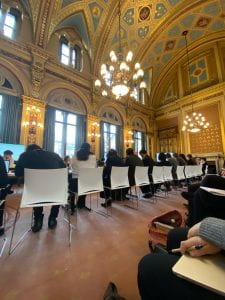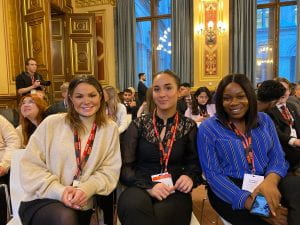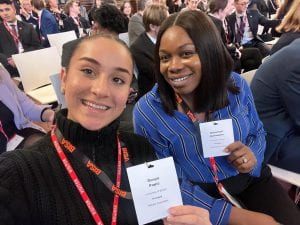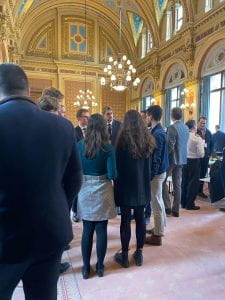 Last month, SPAIS students heard from four accomplished alumni about their routes into business, government, NGOs and publishing. Here are some of the top takeaways from the discussion.
Last month, SPAIS students heard from four accomplished alumni about their routes into business, government, NGOs and publishing. Here are some of the top takeaways from the discussion.
Career Days offer the chance to hear about the wealth and breadth of careers you can undertake with a degree in sociology, politics and international studies.
At our latest event, current students heard from established professionals working in areas related to their fields of study and learned the steps they can take to build their skills and employability.
Head of School Therese O’Toole and Senior Lecturer Raphaël Lefèvre were joined by:
- Georgia Edwards (BSc Politics and International Relations, 2017) – Programme Coordinator at media NGO Witness and Non-Executive Director at The Bristol Cable
- Joe Newell (MSc Society, Politics and Climate Change, 2023) – Policy Adviser at the Department for Energy, Security and Net Zero
- Luke Foster (MSc International Relations, 2023) – Parliamentary Researcher at the House of Commons and formerly the Director of the Bristol Social Science Review
- Lour Nader (MSc Gender and International Relations, 2021) – CEO of Voice It Out, an equality diversity and inclusion coaching consultancy and formerly with United Nations Women
These are just some of the useful ideas and pieces of advice we discovered at Career Day 2024:
Your career path might be strategic rather than linear
Raphaël: In your LinkedIn profile, you state you’ve worked with at least ten organisations over the past seven or eight years. Do you agree that a career doesn’t need to be linear – it can also just be about following opportunities and passions and interests, wherever they might lead you?
‘[…]Trying to work out what I was interested in and how I could get there […] was also about balancing necessity with what I was passionate about.’
Georgia: I’ve had so many roles because I was always trying to work out what I was interested in and how I could get there. And it was also about balancing necessity with what I was passionate about.
When I finished uni, I was [offered a place] on a journalism course with The Bristol Cable, an investigative media co-op, and I realised I would had to get a job alongside to support myself.
I ended up working at Creative Youth Network as a receptionist, and from doing that I came into contact with so many organisations in the city.
I learned so much and it helped me get the job I did afterwards, working in a constituency office with a Bristol MP. So try to get those [necessary jobs] in something related to what you’re interested in – don’t think you have to go straight into your ideal job.
 You can have a successful civil service career outside of London
You can have a successful civil service career outside of London
Raphaël: You’re based in Bath but you travel back and forth to London for your role with the Department for Energy, Security and Net Zero – how does that work?
Joe: The Civil Service is very good about home hybrid working and I do two days a week in London from Bath, which is very doable.
There is a lot of work going on to distribute the Civil Service around the country […] and we have a new office opening up in Bristol soon so potentially opportunities there.
‘We want civil servants all across the UK, not just focused in London and the South.’
There’s also the Places to Grow Scheme which we have across the Civil Service, where if you are based in London, you can move across to a regional office.
They encourage this because we want civil servants all across the UK, not just focused in London and the South.
Your best start to a political career is through local volunteering
Raphaël: Your [career path seems to suggest] that to get into a career in politics, it’s best to start locally. Would you agree?
Luke: In my first year at Bristol I wanted to just go out and have fun, but when covid hit I realised I needed to focus and started volunteering. I got involved in campaigning for the Labour Party in Cornwall in 2017 and that’s what really got me the exposure and taught me how to speak to and engage with MPs.
‘If you do that volunteering someone might take notice of you and know that you would be great for the job.’
Starting locally – even at the level of volunteering for door-knocking – is a really good way to get your face out there and meet people but also make connections with people who could be future MPs.
It gives you a really good leg up in getting to know what makes everything tick and helps you understand your city and your constituency. Otherwise you’re not going to be able to help your MP get re-elected and you’re not going to do a very good job.
So much of getting a job with an MP is word-of-mouth – a lot of times these jobs aren’t advertised. If you do that volunteering someone might take notice of you and know that you would be great for the job.
 Your degree could could open routes into business and entrepreneurship
Your degree could could open routes into business and entrepreneurship
Raphaël: As a lecturer, you moved to create your own coaching consultancy – how does one go into business and and what led you there?
Lour: After my Master’s, I went back to my career in teaching so that I could experiment with the business and still put food on the table.
I’ve since put the my two passions together – when I went back to the classroom I realised it isn’t the most diverse environment and I’ve since worked to make it more inclusive.
‘[…] Try to pursue the things you are interested in and your experiences will show you what you should be doing.’
My advice to students is that you’re not expected to know exactly what you want to do right now. When I was doing my degree, I thought I wanted to get a permanent job with UN Women or an agency. With more experience I realised I didn’t want to sit drafting policies – I want to be out doing something dynamic.
The only reason I know I’m passionate about equality in education is through experience. So try to pursue the things you are interested in and your experiences will show you what you should be doing.
Don’t fall for the trap of looking at what other people are achieving – maybe you’ll want to do a PhD at fifty, or start a business when you’re forty. Maybe you’ll want to work in a cafe for a couple of years until you work out what you want to do.
You are each on your own journey. Look to where you want to be and experiment with it.
Your Master’s can help set you apart in the jobs market
Raphaël: How useful was your Master’s degree? Because you did a BSc Politics and International relations and then did your Master’s in International Relations – was that helpful?
Luke: It was useful in the sense that these jobs are so competitive, you need to have something that sets you apart. Generally everyone who is applying to these politics jobs has an undergraduate degree and other people applying might be older, have worked in an NGO or a charity and have real hard evidence of their experience.
‘[…] It’s a good use of your time to stay in Bristol and do a Master’s. I don’t think I would have got my second job without it.’
[So] if you don’t have experience in industry it’s a good use of your time to stay in Bristol and do a Master’s. I don’t think I would have got my second job without it – my volunteering and university experience is what I leant on. Coming from a place like Bristol worked well too, because there is such a strong international relations community here.
But everyone will have their own route into these things – some might find it better to do a lot of jobs and volunteering alongside their undergraduate degree instead. But for me, it worked. You get a good discount if you continue into a Master’s too.
 You can gain valuable experience outside of unpaid internships
You can gain valuable experience outside of unpaid internships
Student question: How would you recommend someone get experience [in their industry] without doing unpaid internships? Are there alternate ways to get experience?
Lour: That’s a good question. There are many free events you can attend that will give you exposure and get you to know people that have opportunities for collaboration.
UN Women did something called ‘Commission on Women’s Status’ and gathered in New York with all their representatives. That is expensive to attend! But I participated online – when they sent an email about the event, I replied asking if I could attend remotely.
‘[…] There is a lot you can do for free that will get you that little bit closer. You just have to search those opportunities out.’
I was able to talk to many people over the course of the event and realised that there are many organisations closer to me in Birmingham that are interested in getting support on EDI, and I went on to advise many of them [and gain experience that way].
So check your University’s events, check Eventbrite, sign up for emails – there is a lot you can do for free that will get you that little bit closer. You just have to search those opportunities out.
Please contact Dr Raphaël Lefèvre if you have any questions or feedback on Career Day.
 The Peace, Conflict and Violence Research Group and the Global Insecurities Centre are delighted to announce a call for nominations for this year’s Best Master’s Dissertation and Best PhD Thesis on topics related to peace, conflict and/or violence.
The Peace, Conflict and Violence Research Group and the Global Insecurities Centre are delighted to announce a call for nominations for this year’s Best Master’s Dissertation and Best PhD Thesis on topics related to peace, conflict and/or violence.

 Last month, SPAIS students heard from four accomplished alumni about their routes into business, government, NGOs and publishing. Here are some of the top takeaways from the discussion.
Last month, SPAIS students heard from four accomplished alumni about their routes into business, government, NGOs and publishing. Here are some of the top takeaways from the discussion. You can have a successful civil service career outside of London
You can have a successful civil service career outside of London Your degree could could open routes into business and entrepreneurship
Your degree could could open routes into business and entrepreneurship You can gain valuable experience outside of unpaid internships
You can gain valuable experience outside of unpaid internships The University’s applied research project programme connects innovative businesses with talented future researchers. Here’s how postgraduate student Ewan Shipley partnered with Map Impact to produce an insightful report on Biodiversity Net Gain (BNG).
The University’s applied research project programme connects innovative businesses with talented future researchers. Here’s how postgraduate student Ewan Shipley partnered with Map Impact to produce an insightful report on Biodiversity Net Gain (BNG). Join Professor Jason Arday, the University of Bristol and The British Academy for an insightful exploration of one of the most seminal and divisive albums of all time.
Join Professor Jason Arday, the University of Bristol and The British Academy for an insightful exploration of one of the most seminal and divisive albums of all time.
 Newly graduated students Zac, Maria, Baher and Zoe on their best memories of studying at Bristol.
Newly graduated students Zac, Maria, Baher and Zoe on their best memories of studying at Bristol. Dr Jack Nicholls and students from the University have spent the past two years working with Bristol City Council on a vital community development project.
Dr Jack Nicholls and students from the University have spent the past two years working with Bristol City Council on a vital community development project.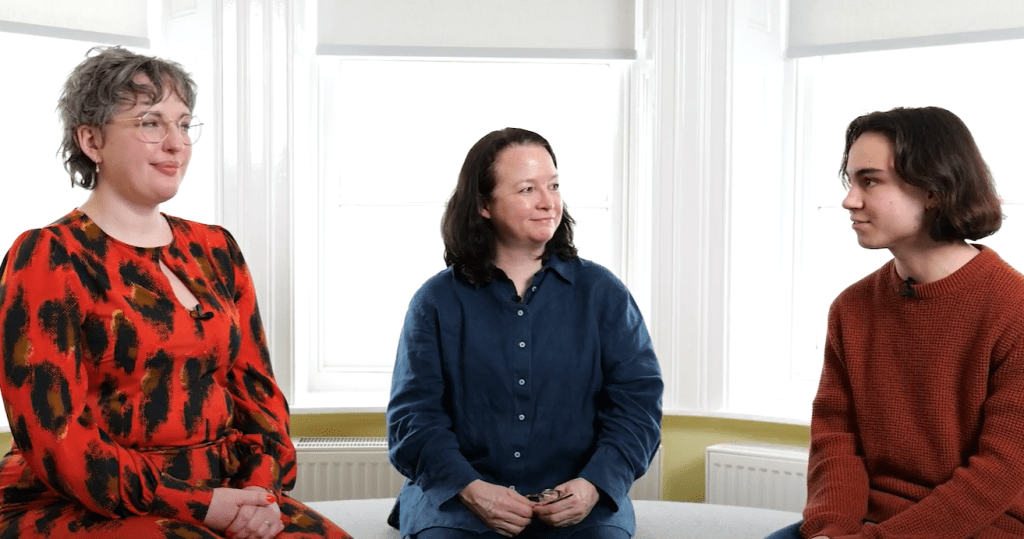 Head of School Therese O’Toole, Student Experience Coordinator Rosie Nelson and UG student Elliot discuss how your suggestions and ideas directly impact decision-making within the School.
Head of School Therese O’Toole, Student Experience Coordinator Rosie Nelson and UG student Elliot discuss how your suggestions and ideas directly impact decision-making within the School.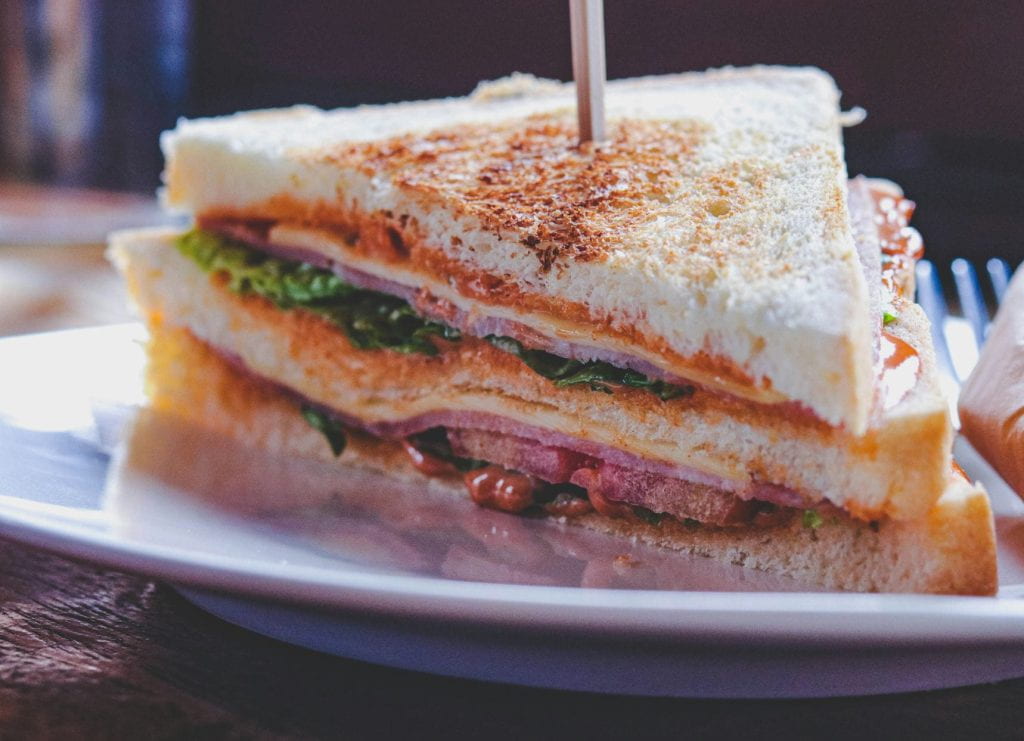 Dr Jennifer Whillans, Lecturer in Sociology at SPAIS, has been investigating what our ‘sad desk sandwich’ says about British working culture. Could it be there’s more than low standards at play?
Dr Jennifer Whillans, Lecturer in Sociology at SPAIS, has been investigating what our ‘sad desk sandwich’ says about British working culture. Could it be there’s more than low standards at play?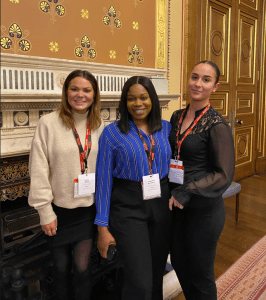 Last month, students Verity, Chinumezi and Dunya represented the University of Bristol at a Model NATO event organised by the British International Studies Association (BISA).
Last month, students Verity, Chinumezi and Dunya represented the University of Bristol at a Model NATO event organised by the British International Studies Association (BISA).